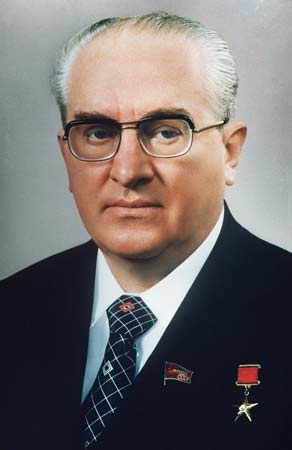Andropov, Yury Vladimirovich
president of Union of Soviet Socialist Republics
born June 15 【June 2, Old Style】, 1914, Nagutskoye, Russia
died Feb 9, 1984, Moscow
 head of the Soviet Union's KGB (State Security Committee) from 1967 to 1982 and his country's leader as general secretary of the Communist Party's Central Committee from November 1982 until his death 15 months later.
head of the Soviet Union's KGB (State Security Committee) from 1967 to 1982 and his country's leader as general secretary of the Communist Party's Central Committee from November 1982 until his death 15 months later.The son of a railway worker, Andropov was a telegraph operator, film projectionist, and boatman on the Volga River before attending a technical college and, later, Petrozavodsk University. He became an organizer for the Young Communist League (Komsomol) in the Yaroslav region and joined the Communist Party in 1939. His superiors noticed his abilities, and he was made head of the Komsomol in the newly created Karelo-Finnish Autonomous Republic (1940–44).
The turning point in Andropov's career was his transfer to Moscow (1951), where he was assigned to the party's Secretariat staff, considered a training ground for promising young officials. As ambassador to Hungary (July 1954–March 1957), he played a major role in coordinating the Soviet invasion of that country. Andropov then returned to Moscow, rising rapidly through the Communist hierarchy and, in 1967, becoming head of the KGB. Andropov's policies as head of the KGB were repressive; his tenure was noted for its suppression of political dissidents.
Andropov was elected to the Politburo, and, as Soviet leader Leonid Brezhnev's health declined, Andropov began to position himself for succession, resigning his KGB post in 1982. Andropov was chosen by the Communist Party Central Committee to succeed Brezhnev as general secretary on November 12, scarcely two days after Brezhnev's death. He consolidated his power by becoming chairman of the Presidium of the Supreme Soviet (president) on June 16, 1983.
Ill health overtook him by August 1983, and thereafter he was never seen again in public. He accomplished little and was succeeded by a former rival, Konstantin Chernenko (Chernenko, Konstantin Ustinovich).
- Marjorie Kinnan Rawlings
- Marjorie Pollard
- Marjorie Tallchief
- Marj ʿUyūn
- mark
- Mark Akenside
- Mark Aldanov
- Markandaya, Kamala
- Mark Antony
- Mark Boxer
- Mark Burnett
- Mark Clark
- Mark Donskoy
- Markelius, Sven
- Marken
- marker bed
- market
- Market Harborough
- marketing
- marketing board
- Market maturity of vegetables
- market research
- market socialism
- Mark Goodson
- Markham, Beryl